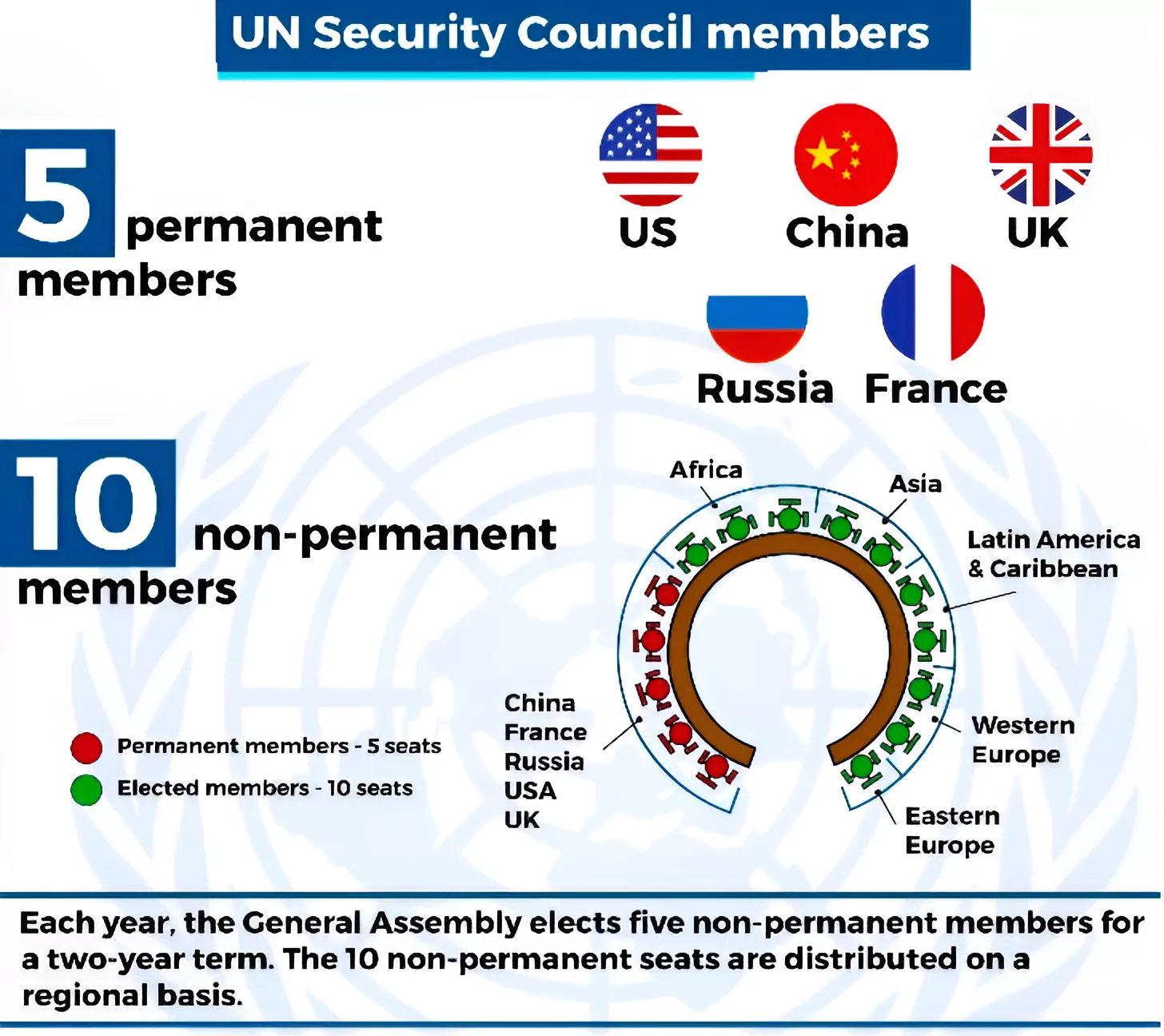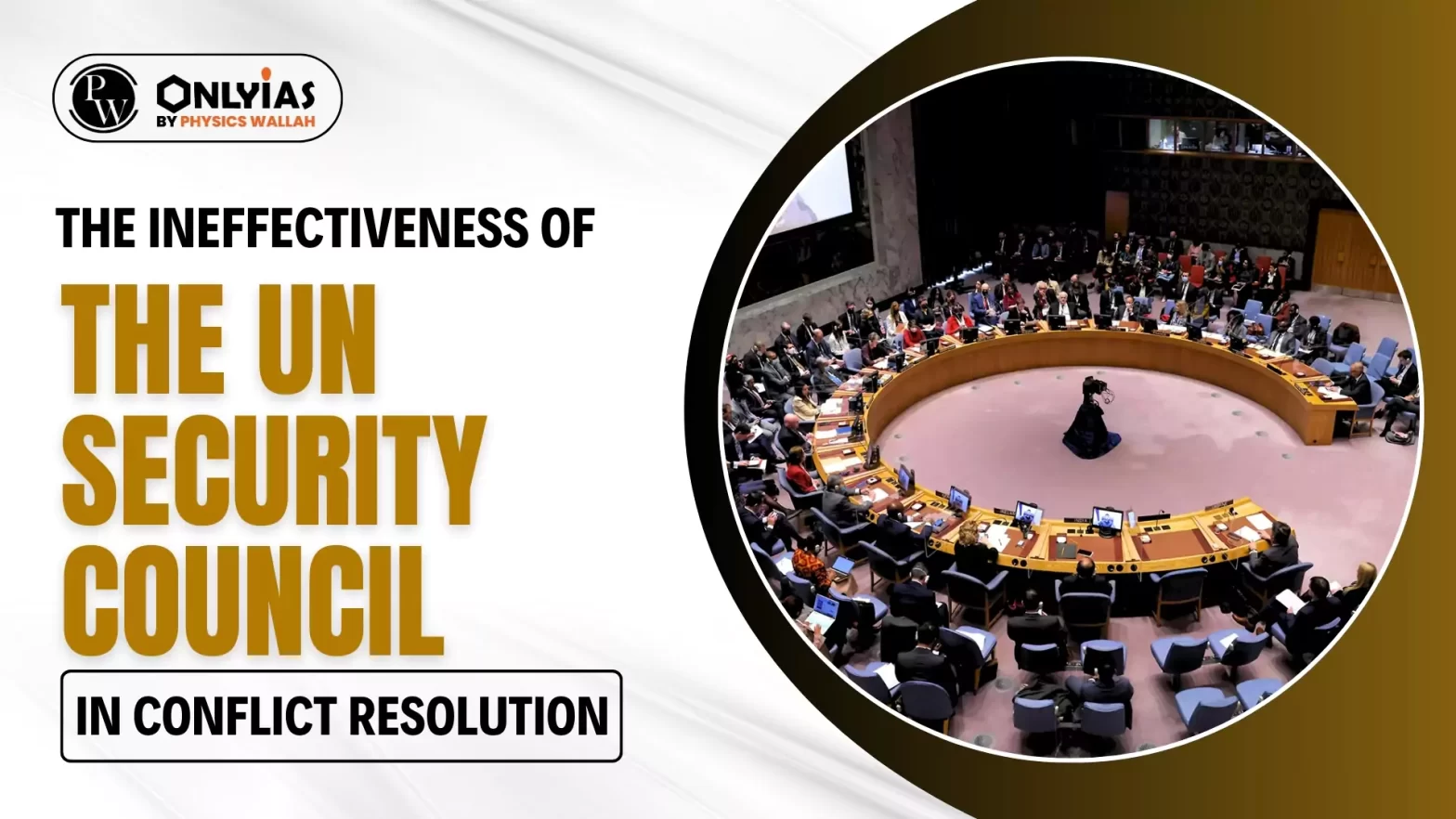Context
Amidst a notable increase in the number of wars and the noticeable spread of hotspots around the globe, the UN Security Council failed to take any action to stop wars.
UN Security Council’s Ineffectiveness in Conflict Resolution
- The world today is experiencing a worrying state of instability and security deterioration, amidst a notable increase in the number of wars and the noticeable spread of hotspots around the globe.
- Ukraine War: The draining war in Ukraine has entered its third year with no end in sight.
- Conflict in Gaza: The conflict in Gaza is now in its seventh month with a bleak deadlock that offers no solace and threatens the future of the entire region.
- Conflicts around the Globe: Conflict in Sudan and Yemen to the instability in Libya, Syria, Lebanon, Iraq, and Afghanistan and tensions in Ethiopia, the Horn of Africa, and some regions of Latin America.
- Armenia and Azerbaijan Conflict: The conflicts in the Nagorno-Karabakh region between Armenia and Azerbaijan.
- South China Sea dispute: Escalating tensions in the South China Sea.
- USA China Cold War: Cold War in the Pacific between the West and China.
Enroll now for UPSC Online Course
Evolution of UN Security Council
- Failure of League of Nations: Hopes were placed on the United Nations” established on October 24, 1945, on the ruins of a brief and failed experiment known as the “League of Nations.
- Consensus on Veto Power at the UN Security Council (UNSC): The United States, Britain, France, China, and Russia; who agreed at the Yalta Conference in February 1945 to share power by obtaining the veto right in the Security Council.
- San Francisco Conference: At the “San Francisco Conference,” the world entrusted the United Nations Security Council with the fundamental tasks of maintaining peace and security worldwide.
- Responsibility of the United Nations Security Council: The United Nations, the “Security Council” is primarily responsible for the preservation of international peace and security according to Chapter VII of the United Nations Charter.
- Powers of UNSC: Its powers include peacekeeping operations, the imposition of international sanctions, and the authorization of military action.
 Binding Resolutions on Member Nations: It is the only body in the United Nations authorized to adopt binding resolutions for member states.
Binding Resolutions on Member Nations: It is the only body in the United Nations authorized to adopt binding resolutions for member states.- Objections to Veto Power: At the San Francisco Conference 1945 there were many objections to the veto right, and the request of the Australian delegation member to impose more restrictions on it was rejected.
- Pressure by USA to Include Veto Power: Francis Wilcox, advisor to the American delegation, frankly stated, “Either the Charter includes the right of veto, or there is no Charter at all.”
- Political Bickering Tool: The start of excessive and cunning use of the veto and its prominence on the international stage was a tool for political bickering.
Veto Power of UN Security Council
- Extensive use of the Veto Power: The veto’s extensive use has effectively paralyzed the Security Council, rendering it powerless and subject to continuous criticism.
- Demand for Reforms in the UN Security Council (UNSC): Criticism mounts from various quarters, demanding fundamental reforms, veto abolition, or expansion to include new permanent members.
- Recent examples of Misusing Veto: Recent conflicts in Ukraine and Gaza have exacerbated frustrations, with Russia’s veto stalling action on Ukraine and the US veto hindering ceasefires in Gaza.
- Ineffective in Upholding Law: The UN Security Council, once a peacekeeping tool, now indirectly legislates wars, leaving many disillusioned and viewing it as ineffective in upholding international law.
Enroll now for UPSC Online Classes
Conclusion
The ongoing debate on UN Security Council reform must prioritize sustaining the United Nations‘ relevance in the twenty-first century by attaining equal representation through innovative ideas that balance growing nations’ goals with the concerns of incumbent permanent members.
Also Read: India Abstains At UNHRC Council Gaza Ceasefire
| Prelims PYQ (2022):
With reference to the “United Nations Credentials Committee”, consider the following statements:
1. It is a committee set up by the UN Security Council and works under its supervision.
2. It traditionally meets in March, June and September every year.
3. It assesses the credentials of all UN members before submitting a report to the General Assembly for approval.
Which of the statements given above is/are correct?
(a) 3 only
(b) 1 and 3
(c) 2 and 3
(d) 1 and 2
Ans: (a) |
![]() 12 Apr 2024
12 Apr 2024

 Binding Resolutions on Member Nations: It is the only body in the United Nations authorized to adopt binding resolutions for member states.
Binding Resolutions on Member Nations: It is the only body in the United Nations authorized to adopt binding resolutions for member states.